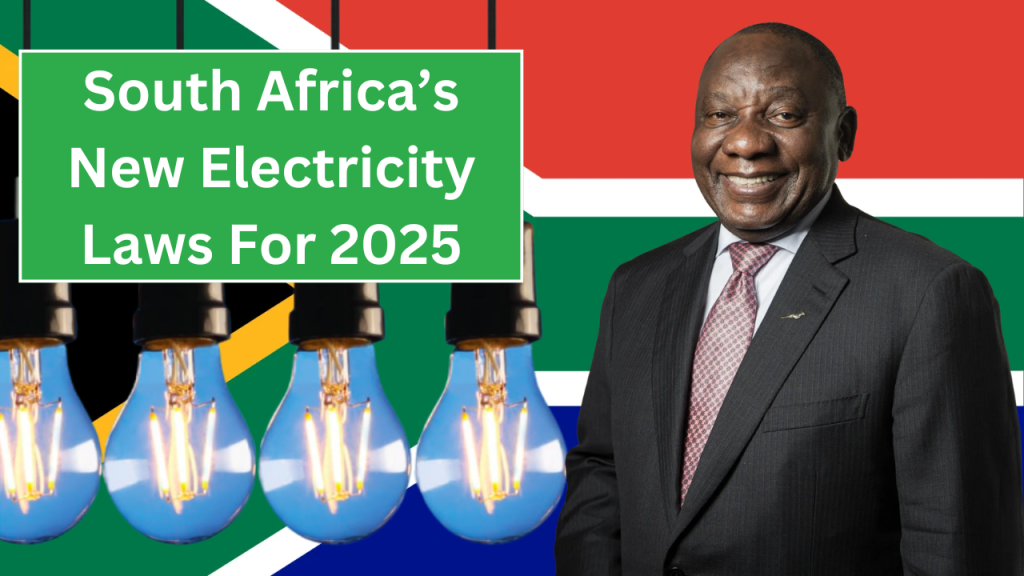
The South African government is set to implement new electricity laws in 2025, aimed at addressing the nation’s ongoing energy crisis. These laws are part of a broader effort to modernize the energy sector, transition to renewable energy sources, and provide stable and reliable power to households and businesses. By tackling issues such as load-shedding, aging infrastructure, and reliance on coal, the new regulations are designed to benefit citizens, businesses, and the economy at large. Below, we explore the key aspects of these reforms and their anticipated impact.
Overview of South Africa’s New Electricity Laws (2025)
| Aspect | Details |
|---|---|
| Purpose | Energy sector reform and modernization |
| Key Goals | Reduce coal dependency, promote renewables |
| Renewable Energy Target | 50% by 2030 |
| Private Sector Role | Encouraging Independent Power Producers (IPPs) |
| Consumer Benefits | Fair pricing, improved reliability |
| Implementation Challenges | High costs, public cooperation, bureaucracy |
Double SASSA Grant Payments 2025, What You Must Know About Key Changes
SASSA Payment Schedule 2025, Solutions to Common Problems
Experts Urge SASSA to Increase the Child Support Grant in 2025
SASSA Payment Deposit 2025, Check Key Dates and Requirements
SRD Payment February Increase 2025, Check Payment Release Details
Why Were These Laws Necessary?
South Africa’s energy sector has faced significant challenges over the past few years. Frequent load-shedding, outdated infrastructure, and overdependence on coal have disrupted daily life and hindered economic growth. These issues necessitated urgent reforms to create a more reliable and sustainable energy system.
The new laws align with the government’s broader strategy to:
- Shift away from coal to cleaner energy sources.
- Encourage private sector involvement to increase electricity generation.
- Streamline policies to attract investments in renewable energy.
- Ensure transparent and fair electricity pricing for consumers.
Key Features of the 2025 Electricity Laws
- Expansion of Renewable Energy Projects:
The new laws aim to diversify energy generation by incorporating solar, wind, and hydropower. The government has set an ambitious goal of 50% renewable energy contribution by 2030. - Private Sector Participation:
The laws allow Independent Power Producers (IPPs) to contribute to the national grid. This move is expected to supplement Eskom’s coal-based power generation and create a more competitive energy market. - Energy Storage Solutions:
Large-scale battery storage systems will be developed to store excess electricity generated during peak production. This stored energy can be used during high-demand periods, improving overall grid reliability. - Smart Grid Technology:
Smart technology will be integrated into the national grid to optimize energy distribution, reduce power losses, and enhance load management. - Consumer Protections:
The new regulations ensure fair pricing and transparency in electricity tariffs. Limited subsidies may also be provided to low-income households to make electricity more affordable. - Decentralized Energy Systems:
The government plans to promote community-based energy projects, such as solar cooperatives, to empower local communities and reduce dependence on the national grid.
Impact on South Africans
The new electricity laws are expected to bring several benefits to citizens and industries:
- Improved Power Supply: Reduced load-shedding and better grid management will ensure a more reliable energy supply.
- Lower Energy Costs: Increased competition in the energy market will help reduce electricity costs over time.
- Job Creation: The shift to renewable energy and infrastructure upgrades will create thousands of new jobs.
- Environmental Benefits: Transitioning to cleaner energy sources will reduce pollution and help combat climate change.
Challenges in Implementation
While the reforms are promising, their implementation may face challenges, including:
- High Costs: The financial resources required for renewable energy projects and infrastructure upgrades are substantial.
- Public Cooperation: Educating the public about the benefits of the new laws and ensuring their support will be critical.
- Bureaucratic Delays: Overcoming administrative hurdles will be essential to maintain progress on reforms.
To address these challenges, the government has developed detailed plans with clear schedules and benchmarks to ensure smooth implementation.
FAQs
1. What are the primary goals of the new electricity laws?
The new laws aim to modernize South Africa’s energy sector by promoting renewable energy, reducing dependence on coal, encouraging private sector participation, and ensuring fair electricity pricing.
2. When will these laws come into effect?
The new electricity laws are set to be implemented in 2025 as part of the government’s broader energy reform strategy.
The 2025 electricity reforms mark a significant step forward for South Africa. By focusing on renewable energy, private sector involvement, and modern technologies, these laws have the potential to create a more reliable, affordable, and sustainable energy future for the nation.


